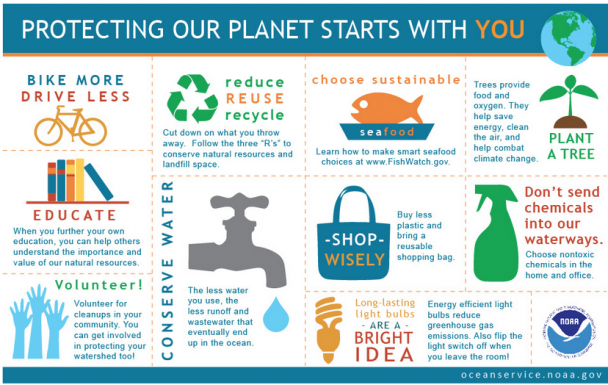Protecting our Planet Starts with You

For the past 50 years, Earth Day has been celebrated by billions of people around the globe, annually every April 22, to join together in promoting awareness for the health of our environment. Why should we continue to celebrate this holiday? Some people may view it as just another holiday, or an excuse to wear green and a flower crown, but with serious concerns about our changing environment being studied and addressed today by prominent scientists, politicians, and young climate change activists alike. Additionally, many people are adapting to more environmentally friendly ways of living, every day, not just on April 22. For example people are participating in garden composting, recycling, repurposing, carpooling, thrifting, and using metal straws to save the turtles.
The idea for Earth Day was originally born in 1969, when U.S. Senator named Gaylord Nelson, witnessed the effects of a massive oil spill in Santa Barbara, CA. He called to action all Americans to take a stand for the environment in 1970, and thousands of colleges and universities across the United States organized protests for a healthy, sustainable Earth. This included air pollution from factories and freeways, as well as the loss of habitats for animals and animal extinction. As a result of these national rallies, the first Earth Day, April 22, 1970, helped create the United States Environmental Protection Agency and the Clean Air, Clean Water, and Endangered Species Acts into law.
When 1990 approached, a group of environmental leaders asked Denis Hayes to organize another big campaign. This time, Earth Day went global, mobilizing 200 million people in 141 countries and lifting environmental issues onto the world stage. In 1995, President Bill Clinton awarded Senator Nelson the Presidential Medal of Freedom (the highest honor given to civilians in the United States) for his role as Earth Day 2022 founder. Today, it is now observed in 192 countries, and coordinated by the non-profit Earth Day Network.
Today, there are many similar concerns related to the health of Earth and unfortunately they are even messier than that original oil spill. Increasing natural disasters, extreme weather, and rising global temperatures may seem impossible for one human, let alone millions or even billions of humans, to slow down, or stop the changes happening to the planet. But one small action, picking up litter, participating in recycling, and many more individual actions have a huge impact. See Protecting the Planet Starts With You chart or check out: EarthDay.org
Facts about the planet: There are 5.25 trillion pieces of plastic waste estimated to be in our oceans; 269,000 tons float, 4 billion microfibers per km² dwell below the surface. The largest trash site on the planet is the Great Pacific Garbage Patch, twice the surface area of Texas, it outnumbers sea life there 6 to 1. There are 300 million tons of plastic created yearly, and this weighs the same as the entire human population, and 50% is single-use only. Annually we discard 1 trillion plastic bags worldwide; joining them together would circle the globe 4,200 times.
According to the World Health Organization air pollution kills an estimated seven million people worldwide every year. WHO data shows that almost all of the global population (99%) breathe air that exceeds WHO guideline limits containing high levels of pollutants. The Center for Disease Control states that climate change is projected to harm human health by increasing ground-level ozone and/or particulate matter air pollution in some locations. Ground-level ozone (a key component of smog) is associated with many health problems, such as diminished lung function, increased hospital admissions and emergency room visits for asthma, and increases in premature deaths.
Here are ten simple things you can do to help the planet:
- Reduce, reuse, and recycle. Cut down on what you throw away. Follow the three "R's" to conserve natural resources and landfill space.
- Volunteer. Volunteer for cleanups in your community. You can get involved in protecting your watershed, too.
- Educate. When you further your own education, you can help others understand the importance and value of our natural resources.
- Conserve water. The less water you use, the less runoff and wastewater that eventually end up in the ocean.
- Choose sustainable. Learn how to make sustainable food choices. totaste.com/eating-sustainably
- Shop wisely. Buy less plastic and bring a reusable shopping bag.
- Use long-lasting light bulbs. Energy efficient light bulbs reduce
- greenhouse gas emissions. Also flip the light switch off when you leave the room!
- Plant a tree. Trees provide food and oxygen. They help save energy, clean the air, and help combat climate change.
- Don't send chemicals into our waterways. Choose non-toxic chemicals in the home and office.
- Bike more. Drive less.
Earth Day Activities Party for the Planet: www.earthday.org/more-digital-resources/ Earth Day Resources: mge.com/earthday Ten Free Earth Day Coloring Pages for Kids: www.parents.com Nineteen Activities for Earth Day:teambuilding.com/blog/virtual-earth-day
Category:
The Eagle Grove Eagle
The Eagle Grove Eagle
P.O. Box 6
304 West Broadway
Eagle Grove, IA 50533
Phone: 1-515-448-4745
FAX: 1-515-448-3182
Email: news@eaglegroveeagle.com
Mid-America Publishing
This newspaper is part of the Mid-America Publishing Family. Please visit www.midampublishing.com for more information.